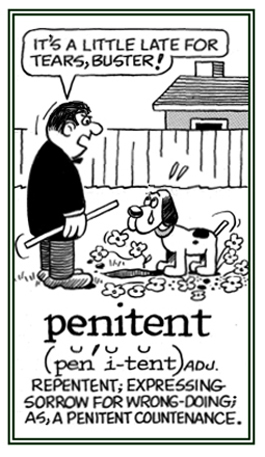poen-, peno-, poino-, poin-, puni-, pain-, penal-, pent-
(Greek > Latin: pain, punishment, penalty)
Shawn's penance for shoplifting in the grocery store was to write an essay on the social costs of shoplifting.
2. A sacramental rite involving contrition, confession of sins to a priest, the acceptance of penalties, and absolution: The pastor led the rite of penance for those in the congregation who attended.2. Etymology: from Latin paenitentem, referring to "a cause or a feeling of regret."

Go to this Word A Day Revisited Index
so you can see more of Mickey Bach's cartoons.
2. Pertaining to penance; penitential: Susan was so sorry for being so rude to her father and wanted to make penitentiary amends for her bad behavior.
Trina was sentenced to forty years in a federal penitentiary for the crime that she committed.
2. 2. In the U.S., the place of punishment in which convicts sentenced to confinement and hard labor are confined by the authority of the law: There are a number of penitentiaries located in the United States including the United States Penitentiary in Pennsylvania, the United States Penitentiary in California, and the United States Penitentiary in Virginia.
2. To have a great desire or longing for someone or something: It was sad to see Bill pine all these months for his college sweetheart.
3. Etymology: From Middle English pinen, which came from Old English pinian, "to torture, to torment, to afflict"; from pin, "pain", ultimately from Latin poena, "punishment".
To pine or "to languish" is a derivative of an unrecorded Old English noun pine, "torture", originally borrowed into Germanic from pena, the post-classical descendant of Latin poena, "penalty" which is also the source of English pain.
Pine was one of the words introduced into Germanic with Christianity, and in English it was applied first to the "pains of hell". The noun has not been found in Old English; however, the verb pinian was common from an early period.
2. To force a person to undergo a penalty: Joe was punished by the judge for dumping his garbage on a park fence and had to do community service for six months!
3. To beat severely, to maul: Evidently the poor dog had been punished terribly and had to be operated on in the animal hospital.


